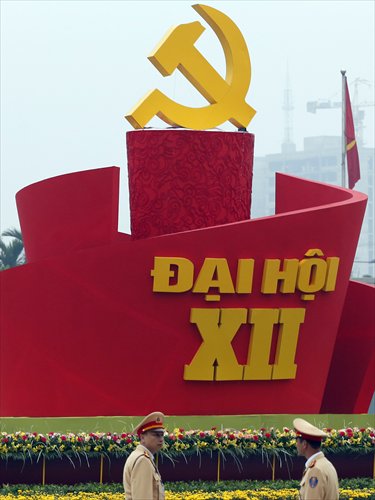Vietnam party convenes to select new leadership
Introducing US into restive region could have consequences: analyst

Traffic police officers stand in front of a decoration with the communist logo promoting the 12th National Congress of the Communist Party of Vietnam before its preparatory session at the national convention center in Hanoi on Wednesday. Photo: AFP
Delegates from the Communist Party of Vietnam (CPV) convened on Wednesday in Hanoi in its five-yearly political transition to select a new group of leaders and discuss crucial topics, such as economic reform and maritime tensions in the South China Sea.
The 12th National Congress of the CPV began with a closed-door preparatory session on Wednesday, which will be followed by an opening ceremony on Thursday.
The congress, which will end on January 28, will approve a five-year economic blueprint and select the next general secretary of the party and members of the political bureau.
Prime Minister Nguyen Tan Dung, who has pushed for reforms in the state sector, is running for general secretary against incumbent Nguyen Phu Trong.
On Wednesday, The CPV Central Committee's Politburo member and President Truong Tan Sang, on behalf of the Politburo and the congress presidium, presided over the preparatory session.
The congress elected 17 members of the Presidium of the 12th National Party Congress. General Secretary of the 11th CPV Central Committee Nguyen Phu Trong was elected as chairman of the Presidium, the Xinhua News Agency reported.
Analysts believe that Vietnam's policy toward China is unlikely to see a significant shift with or without a leadership change. But they are concerned that the South China Sea issue may become more complicated if a pro-US leader is selected at the congress.
"The result of personnel change may not have as much influence on Vietnam's policy toward China as is expected," Sun Xiaoying, research fellow at the Guangxi Academy of Social Sciences, told the Global Times on Wednesday.
Nguyen Tan Dung and Nguyen Phu Trong may have different approaches to the South China Sea disputes, Sun said.
China should keep an eye on US involvement in this area and remind Vietnam of history that there would be consequences in introducing the US into this area, Zhuang Guotu, head of the Center of Southeast Asian Studies at Xiamen University, told the Global Times.
On May 2, 2014, China's HYSY-981 drilling platform started operation in waters close to China's Xisha Islands, an area also claimed by Vietnam. Shortly after the operation started, Vietnam sent a large number of ships, including armed vessels, to disrupt operations of the rig and ram Chinese vessels on escort and security missions.
The incident caused an increase in tensions between Vietnam and China in 2014 and a series of anti-Chinese riots across the Southeast Asian country in which Chinese businesses were attacked, looted and burnt down.
Undisputed waters
China's foreign ministry said Wednesday that the HYSY-981 is not drilling in disputed territory in the South China Sea, in response to a warning from Vietnam against such activity.
Vietnam on Tuesday claimed that Beijing had steered the rig "into a stretch where jurisdiction is unclear."
"According to what is understood, China's HYSY-981 drilling platform is operating in Chinese-controlled waters that are completely undisputed," Chinese foreign ministry spokesman Hong Lei told a daily news briefing.
"We hope the Vietnamese side can view this calmly, meet China half way and jointly work hard to appropriately handle relevant maritime issues."
Maritime disputes or political change within Vietnam should not influence Sino-Vietnam relations. The two countries have developed a more specific and regular system to manage and control disparities regarding the South China Sea in recent years, Zhuang said.
His opinion was echoed by a commentary by Xinhua Wednesday, which says "the change in the CPV's central leadership shall not shake the two countries' commitment to deepen their collaboration."
Agencies contributed to this story